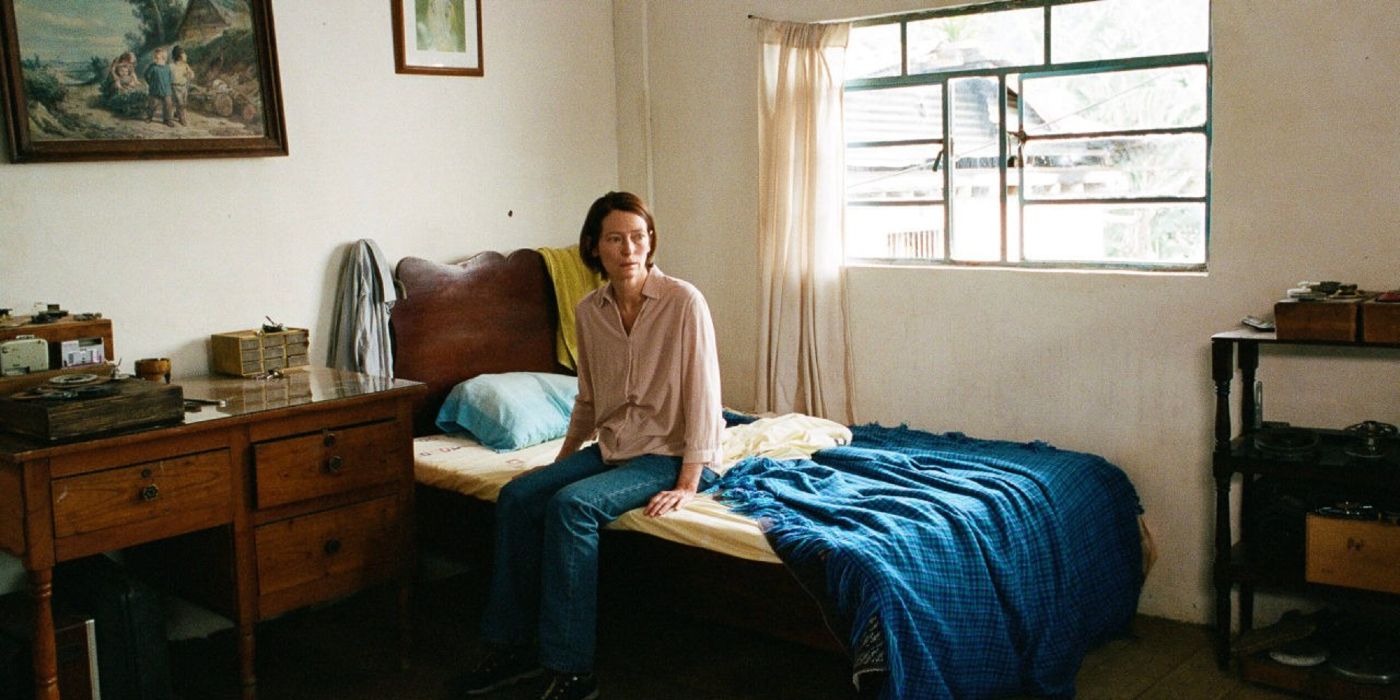Thai director Apichatpong Weerasethakul is known for the dream-like, slow-burn tint that is wrapped around his cinematic oeuvre, be it Tropical Malady or Cemetery of Splendor. His Memoria embraces a similar aura, creating a window into a world that feels ephemeral and timeless all at once while etching an audio-visual synesthesia like no other. Steeped in soundscapes that soothe and unsettle, Memoria unfurls like a fever dream about memory, displacement, and the mysteries of existence.
What Memoria intrinsically means, or in simpler words, what it is about, is difficult to articulate in words. Not only is the film richly layered and wildly interpretative, but also one that is bound to resonate in deeply personal ways with the viewer or not at all, given the glacial nature of most scenes. Memoria opens with almost ten minutes of night-time silence, punctuated by a sudden, rumbling sound that wakes Jessica (Tilda Swinton) from her slumber. The exact nature of the sound is unknown, and she gets up to investigate the source but is unable to fully comprehend it. The deathlike silence of the night is once again pierced by a chain of car alarms, which stops as suddenly as it begins, cementing the unusual, hypnotic sensory experience that defines the core of Memoria.
Jessica resides in Medellín but is currently visiting her ill sister in Bogotá, who is an archaeologist involved in a century-long excavation project adjacent to the Andes mountains. Wishing to delve deeper into the source of the sound (which she starts hearing quite erratically), Jessica approaches sound technician Hernán (Juan Pablo Urrego), who attempts to recreate the sound by putting together sonic samples. “It’s earthier, like a rumble from the core of the earth,” Jessica explains. And while the inexplicable sound might feel and sound different for everyone, it surely is closer to a cavernous roar, a shamanic drum.
As sound is integral to the film’s base language, the scenes unravel more along the lines of a sonic experience as opposed to the visual: the quiet humdrum of an open eatery, the sound of cicadas at night occasionally disrupted by a shout of joy by passersby, the gentle bubbling of a stream, or the stark, often-unbearable empty silence of open spaces. As Jessica frantically searches for answers, her sense of reality also appears to shift somehow, especially when she ventures more towards the countryside. Things are calmer, slower in those spaces, where the self is more spiritually attuned, and the rhythms of a fish being scaled or a fight breaking out between howler monkeys make for a trancelike watch.
Memoria is admittedly an unconventional experience, one that feels both familiar and alien, which might objectively go either way in terms of audience immersion. Some scenes are allowed to reveal themselves at a languid pace, which can either be sleep-inducing or hypnotic, depending on one’s state of mind during the viewing experience. The ending of Memoria is baffling in a haunting way, as expected of a scenario in which a woman with unexplained inconsistencies in her memory meets a man who remembers everything, including events prior to the conception of time. The lull of Memoria would be non-existent without Swinton’s breathtaking presence, as she grounds and elevates the elusive drama with incredible nuance.
Memoria has had an extremely limited theatrical release since December 26, 2021. The film is 136 minutes long and is rated PG for some thematic elements and brief language.



